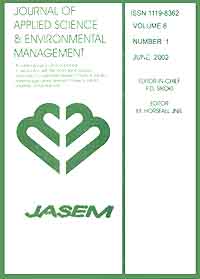
|
Journal of Applied Sciences and Environmental Management
World Bank assisted National Agricultural Research Project (NARP) - University of Port Harcourt
ISSN: 1119-8362
Vol. 13, No. 1, 2009, pp. 73-80
|
 Bioline Code: ja09012
Bioline Code: ja09012
Full paper language: English
Document type: Research Article
Document available free of charge
|
|
|
Journal of Applied Sciences and Environmental Management, Vol. 13, No. 1, 2009, pp. 73-80
| en |
Estimation of the Heat Flow Variation in the Chad Basin Nigeria
Nwankwo, Cyril N.; Ekine, Anthony S. & Nwosu, Leonard I.
Abstract
Wireline logs from 14 oil wells from the Nigerian sector of the Chad Basin were analyzed and
interpreted to estimate the heat flow trend in the basin. Geothermal gradients were computed from corrected bottom
hole temperatures while the bulk effective thermal conductivity for the different stratigraphic units encountered in the
wells were computed from the sonic logs data. The heat flow values were then calculated. A corrected average
geothermal gradient of 3.4 °C/100 m and a regional range of 3.0 to 4.4 °C/100 m were obtained. A porosity range of
2 to 79 % and average of 35 % were computed for Chad Basin Nigeria. Also the thermal conductivities vary from
1.70 and 3.11 Wm-1 °C-1, with an average value of 2.35 Wm-1 °C-1 computed for the various wells in the basin. A large
variation in heat flow was recorded within the basin. Mean heat flow values computed for the basin vary from 63.6 to
105.6 mWm-2, with a simple average of 80.6 mWm-2. Although there is no distinct trend on heat flow within the
basin, the computed heat flow values are relatively lower at the southwestern and northeastern axis of the basin. And
the values obtained in this study compared favorably with those of other world sedimentary basins (including Niger
Delta) that are of similar history with the Chad Basin, suggesting that the Nigerian Chad Basin is a possible
petroliferous basin. @ JASEM
|
| |
© Copyright 2009 - Journal of Applied Sciences & Environmental Management
|
|
